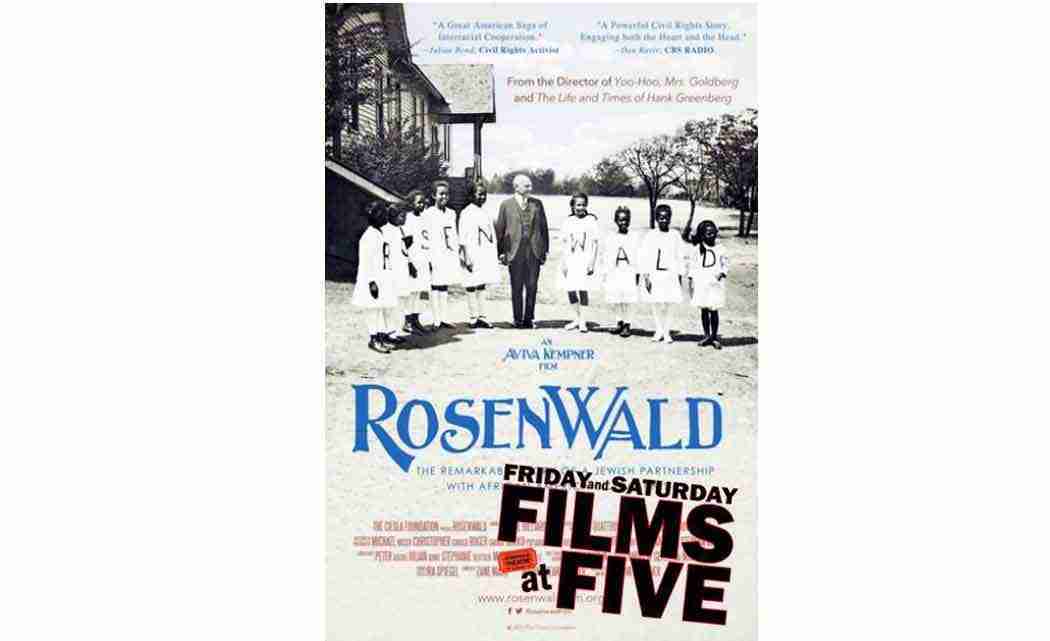Who is Julius Rosenwald? To most, he was the son of a German Jewish immigrant and the CEO of Sears, Roebuck and Company. But, many African-Americans older than fifty years old know the billionaire philanthropist by the nickname, “Rosenwald Schools.”
Aviva Kempner wrote and directed Rosenwald, a film documenting Rosenwald’s investment in the education of Southern Blacks.
“(Rosenwald) had grown up with the Jewish perspective “tikkunolam,” which means ‘repairing the world.’ He wanted to make sure that African-Americans in the Jim Crow South were well-educated,” Kempner said.
Rosenwald will screen locally at AMC Aventura, Classic Gateway Theatre Fort Lauderdale, Movies of Delray, Regal Cinemas Shadowood, and Living Room Theaters at Florida Atlantic University beginning Oct. 2.
Rosenwald, a high school drop-out, was modest about his philanthropy. Modesty notwithstanding, his contributions were incredibly significant. He worked alongside Booker T. Washington, president and founder of the Tuskegee Institute, to build primary schools within the black communities of the Southern United States and provide trained educators.
Between 1911 and 1932, Rosenwald and the community built 5,357 schools across the country. To build the schools, Rosenwald embraced a very intentional belief regarding the source of the funding. A third of the funding would come from him, another third would come from the local legislative branch, and the last third, importantly, would come from the community served. The African-American community would come together to raise funds to match Rosenwald’s donation, provide land, building materials, and their own blood, sweat, and tears to build these school houses, which had their own unique names, but were nicknamed “Rosenwald Schools.”
“When you build it, I think you own it. And the communities had a lot of respect amongst themselves and a lot of pride in the schools and that just made all of the difference,” said Kempner. “If you participate in making something happen you feel more pride about it.”
Rosenwald Schools educated over 600,000 students. U.S. House Representative John Lewis, Washington Post reporter Eugene Robinson and Poet Dr. Maya Angelou are among the notable alumni. Angelou shares in the documentary how delighted she was to attend school because of the beautiful craftsmanship of the building; courtesy of black architect Robert Taylor, great grandfather of President Obama’s senior advisor, Valerie Jarrett.
Many communities took satisfaction in the education and upkeep of their Rosenwald School, while the children who excelled in school were praised throughout the community for encouragement.
Rosenwald’s contributions to the black community extended beyond the construction of his revolutionary schools. He also served on the school board of the Tuskegee Institute and provided funding for the college. He provided matching funds to build Y.M.C.A.s and Y.W.C.A.s for young blacks who were travelling during the Great Migration; when many African-Americans fled Jim Crow South to go north.
The Harlem Renaissance was also boosted by the Rosenwald Fund; an initiative he created to provide fellowships to many black artists and scholars to pursue their goals without worrying about financing. Among the African-Americans who benefited from this fund were Dr. Charles R. Drew, Langston Hughes, Zora Neale Hurston, James Weldon Johnson, W.E.B. Dubois, Katherine Dunham, James Baldwin, Marian Anderson, and Augusta Savage. These individuals and many more went on to make huge impacts on the black community and abroad.
Rosenwald is a film that revisits a heyday in black innovation, creativity, and community that was aided by the son of a Jewish immigrant who saw the importance of a good education and how it had the power to bring together communities and stimulate growth. It’s a timely film that reminds us that, as a community, we have the tools necessary to succeed.
“I think it’s for everyone,” Kempner said about why it’s important for black and white, young and old – to see this historical film. “Today we see so much bad news on TV and in the newspapers that it’s good to come to a film where we see communities working together across racial lines and economics and strive together, because education does make a difference in people’s lives in terms of what they can achieve. And, it’s a great American story.”













[…] Documentary tells beautiful story of Jewish immigrant's commitment to help … He provided matching funds to build Y.M.C.A.s and Y.W.C.A.s for young blacks who were travelling during the Great Migration; when many African-Americans fled Jim Crow South to go north. The Harlem Renaissance was also boosted by the Rosenwald Fund; an … Read more on The South Florida Times […]